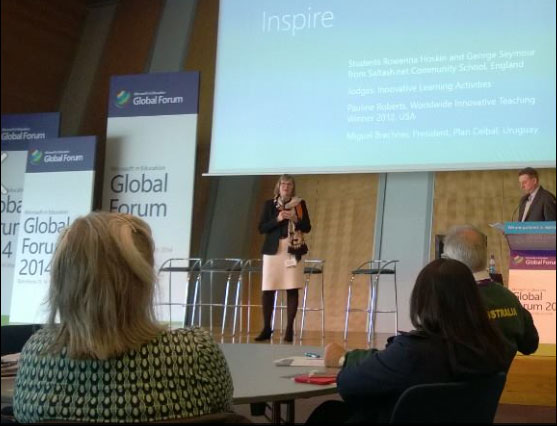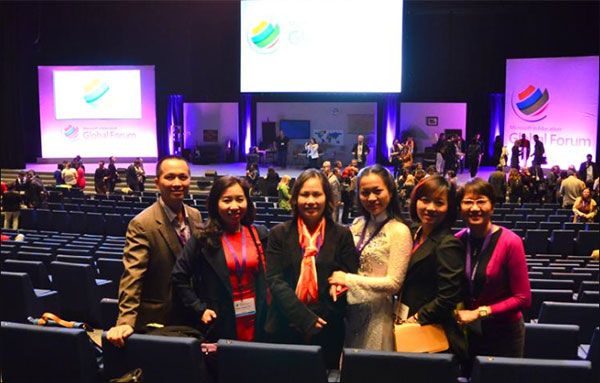Microsoft takes a stand on student privacy

This new programme has been designed to seek out and kick-start the most innovative ideas from school leaders worldwide, allowing schools to pitch for part of a $50,000 fund to help bring their visions to a reality and transform their schools. In addition, in partnership with the British Council, all six projects will be incorporated on YouthSpark on Global Giving to help them continue raising funds for their ideas
Microsoft in Education Global Forum this year was opened on March 12, by emphasising the importance of student privacy and reaffirming its commitment to helping ensure that student data is never mined for advertising and marketing purposes. The opening keynote speech, which took place in front of an audience of 1,100, including innovative educators, school leaders and government officials from nearly 100 countries, also saw Microsoft highlight its end-to-end, best-in-class solutions with student success and career and college readiness at the forefront.
There are three Vietnamese expert educators – To Thuy Diem Quyen, Pham Dang Mai Linh and Nguyen Thuy Hong – and two representatives of mentor schools – Pham Thi Minh An and Le Duc Trung - joining the annual Education Global Forum of Microsoft this year.

“Privacy concerns are holding educators back from making the most of modern technology and preparing students to succeed in today’s workplace. At the same time, many solutions being used in the classroom are unintentionally putting student data at risk,” said Anthony Salcito, vice president, Worldwide Education, Microsoft. “The private sector has a responsibility to give educators the tools and resources that inspire real learning and have a real impact, while ensuring privacy isn’t a barrier to bringing new and innovative technologies into the classroom. This is why Microsoft is committed to taking every measure it can to ensure student information remains safe around the world. We will not, under any circumstance, mine students’ data.”
Microsoft technology is used in 98 per cent of schools worldwide. The company’s end-to-end education solutions take the risk out of deploying the latest technologies and solve educators’ most pressing challenges across the following key areas:
- Productivity and creativity. Microsoft Office 365 Education, an enterprise-quality communication and collaboration tool available in the cloud, is currently used by 110 million students, faculty and staff. This always-on cloud service guarantees that student data will never be mined for advertising. Student Advantage, available for free through qualifying institutions, includes the entire Office suite and more than 4 million students are already getting Office 365 Professional Plus from their schools since it was launched in December 2013. Microsoft Office has also proved valuable to students; a recent IDC study found Microsoft Office proficiency is among the top 20 skills required for high-growth/high-salary occupations.
- Safer, more private search. Bing for Schools ensures students don’t see search ads when using Bing and also enhances their privacy by preventing the use of data to create ad profiles — all with no compromise on the exceptional search experience delivered. No other major search engine can make the same promise.
- Management. Windows Intune is a cloud service that allows school IT administrators to manage Windows, Windows Phone, Android and iOS devices connected to their network over the Web, eliminating the need to own each device or to use onsite servers.
- Professional development. Microsoft offers resources to train teachers on new technology, including the Partners in Learning Network that reaches nearly 1 million educators worldwide and includes online professional development, how-to tutorials, and learning activities created by teachers for teachers.
- Technology training. The Microsoft IT Academy provides industry-leading technology skills to more than 8.5 million teachers and students in 130 countries to help bridge the technology skills gap. In addition, Microsoft has helped educators around the world successfully incorporate technology into the classroom to enhance the learning experience for their students through programs such as Teaching With Technology.
- Device choice. Microsoft works with its original equipment manufacturer (OEM) partners to bring better choice and quality and more affordable devices powered by Microsoft software and services to market for educators and students around the world.
- YouthSpark Initiative. Microsoft’s focus on privacy in education is part of its overall commitment to empowering youth through opportunities for education, employment and entrepreneurship.
“We’ve chosen Microsoft because the company provides an end-to-end solution that meets all our needs — innovative and secured devices, best-in-class productivity, and collaboration apps and comprehensive management capabilities. In addition, the company provides the training and resources our educators need to ensure that our technology investments are successful,” said Clayton Carnes, school leader, Hermit Park State School in Australia. “Microsoft’s unwavering commitment to student privacy is also extremely important to us because we can rest assured that our students’ data isn’t being mined for advertising and marketing purposes. This commitment really sets Microsoft apart in the market.”
Now in its 10th year, the Microsoft in Education Global Forum brings together more than 1,100 of the most innovative and committed educators, school leaders and government officials from around the world — including more than 250 expert educators and 75 mentor school leaders. Each year, the Global Forum provides an opportunity for education’s best and brightest to learn from their peers, share classroom triumphs and challenges, and collaborate to help transform education for the 21st century.
Microsoft’s focus on privacy in education is part of the YouthSpark initiative, our global commitment to empowering youth through opportunities for education, employment and entrepreneurship. In its first year alone, YouthSpark created new opportunities for more than 103 million young people in over 100 countries around the world.
What the stars mean:
★ Poor ★ ★ Promising ★★★ Good ★★★★ Very good ★★★★★ Exceptional
Latest News
More News
- State corporations poised to drive 2026 growth (February 03, 2026 | 13:58)
- Why high-tech talent will define Vietnam’s growth (February 02, 2026 | 10:47)
- FMCG resilience amid varying storms (February 02, 2026 | 10:00)
- Customs reforms strengthen business confidence, support trade growth (February 01, 2026 | 08:20)
- Vietnam and US to launch sixth trade negotiation round (January 30, 2026 | 15:19)
- Digital publishing emerges as key growth driver in Vietnam (January 30, 2026 | 10:59)
- EVN signs key contract for Tri An hydropower expansion (January 30, 2026 | 10:57)
- Vietnam to lead trade growth in ASEAN (January 29, 2026 | 15:08)
- Carlsberg Vietnam delivers Lunar New Year support in central region (January 28, 2026 | 17:19)
- TikTok penalised $35,000 in Vietnam for consumer protection violations (January 28, 2026 | 17:15)
















 Mobile Version
Mobile Version